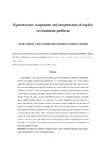Mostrar o rexistro simple do ítem
Eigenstructure assignment and compensation of explicit co-simulation problems
| dc.contributor.author | Tamellin, Iacopo | |
| dc.contributor.author | Richiedei, Dario | |
| dc.contributor.author | Rodríguez, Borja | |
| dc.contributor.author | González Varela, Francisco Javier | |
| dc.date.accessioned | 2023-12-18T12:20:04Z | |
| dc.date.issued | 2022 | |
| dc.identifier.citation | Iacopo Tamellin, Dario Richiedei, Borja Rodríguez, Francisco González, Eigenstructure assignment and compensation of explicit co-simulation problems, Mechanism and Machine Theory, Volume 176, 2022, 105004, ISSN 0094-114X, https://doi.org/10.1016/j.mechmachtheory.2022.105004. | es_ES |
| dc.identifier.uri | http://hdl.handle.net/2183/34531 | |
| dc.description.abstract | [Abstract] Co-simulation is an effective and versatile way to determine the forward-dynamics behaviour of complex engineering applications. In co-simulation setups, the overall system dynamics is split into several subsystems that evolve in time separately. This makes it possible to use modelling and integration methods that can be tailored to the specific nature and behaviour of each of them. Co-simulation subsystems coordinate their execution by means of information exchanges through a discrete-time interface. In some cases, this limited exchange of data can cause accuracy and stability issues in the simulation process, especially when explicit coupling schemes are employed. Correction algorithms are then required to ensure the accuracy of the obtained results. This paper provides insight into the structure of explicit co-simulation problems, revealing the effect of input extrapolation at the discrete-time interface between subsystems. The resulting system equations are formulated in terms of control theory expressions, which can be then used to develop compensation solutions to correct the perturbations introduced at the co-simulation interface. The compensator architecture is chosen to ensure the eigenstructure assignability condition, which has been ad-hoc developed in this paper. These aspects are illustrated here in the explicit co-simulation of linear mechanical systems. | es_ES |
| dc.description.sponsorship | Xunta de Galicia; ED431F2021/04 | es_ES |
| dc.description.sponsorship | Ministerio de Economía, Industria y Competitividad; RYC2016-20222 | es_ES |
| dc.language.iso | eng | es_ES |
| dc.relation.uri | https://doi.org/10.1016/j.mechmachtheory.2022.105004 | es_ES |
| dc.rights | Atribución-NoComercial-SinDerivadas 3.0 España | es_ES |
| dc.rights.uri | http://creativecommons.org/licenses/by-nc-nd/3.0/es/ | * |
| dc.subject | Co-simulation | es_ES |
| dc.subject | Explicit coupling schemes | es_ES |
| dc.subject | Pole placement | es_ES |
| dc.subject | Eigenstructure assignment | es_ES |
| dc.subject | Extrapolation | es_ES |
| dc.subject | Linear mechanical systems | es_ES |
| dc.subject | Co-simulación | es_ES |
| dc.subject | Sistemas de acoplamiento explícito | es_ES |
| dc.subject | Colocación de polos | es_ES |
| dc.subject | Asignación de estructura propia | es_ES |
| dc.subject | Extrapolación | es_ES |
| dc.subject | Sistemas mecánicos lineales | es_ES |
| dc.title | Eigenstructure assignment and compensation of explicit co-simulation problems | es_ES |
| dc.type | info:eu-repo/semantics/article | es_ES |
| dc.rights.access | info:eu-repo/semantics/embargoedAccess | es_ES |
| dc.date.embargoEndDate | 2024-11-01 | es_ES |
| dc.date.embargoLift | 2024-11-01 | |
| UDC.journalTitle | Mechanism and Machine Theory | es_ES |
| UDC.volume | 176 | es_ES |
| UDC.issue | 105004 | es_ES |
| UDC.startPage | 1 | es_ES |
| UDC.endPage | 26 | es_ES |
| dc.identifier.doi | 10.1016/j.mechmachtheory.2022.105004 |
Ficheiros no ítem
Este ítem aparece na(s) seguinte(s) colección(s)
-
LIM - Artigos [51]






